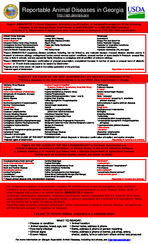Reportable Animal Diseases in Georgia
http://agr.georgia.gov
Report IMMEDIATELY clinical diagnosis, laboratory confirmation, or reasonable suspicion of the following diseases to the Georgia State Veterinarian at (404) 656-3667 or 1-800-282-5852 (primary)
or to the U.S. Department of Agriculture Area Veterinarian in Charge at (770) 922-7860 (secondary).
African Horse Sickness African Swine Fever Avian Influenza* Classical Swine Fever (Hog Cholera) Contagious Bovine Pleuropneumonia Contagious Ecthyma (Soremouth) Foot and Mouth Disease (any type)
Heartwater Lumpy Skin Disease Newcastle Disease (Exotic) Nipah Virus Peste des Petits Ruminants Plague* Rift Valley Fever
Rinderpest Screwworm Sheep Pox and Goat Pox Swine Vesicular Disease Vesicular or Ulcerative Conditions Vesicular Exanthema Vesicular Stomatitis (VS, any type)
Report IMMEDIATELY suspicious disease conditions including, but not limited to, any vesicular disease; mucosal disease; abortion storms in
livestock of unknown etiology; undiagnosed bovine central nervous system conditions; unusual number of acute deaths in livestock; unusual flies, mites or ticks in animals; and any apparently highly infectious or contagious animal condition of unknown etiology.
Report IMMEDIATELY laboratory confirmation of unusual presentation, unexplained increase in number of cases or unusual trend of aflatoxin,
botulism* or T2 toxin that is suspected to be caused by bioterrorism.
Reports of any of the above will result in immediate quarantine of the premises.
*Potential agent of bioterrorism
Reportable in humans and animals
Report BY THE CLOSE OF THE NEXT BUSINESS DAY any laboratory confirmation of the
following diseases to the State Veterinarian or to the USDA Area Veterinarian in Charge.
Akabane Virus Disease Anthrax* Aujeszky's Disease Avian Chlamydiosis* (Psittacosis) Babesiosis (in livestock, any spp) Bluetongue Borna Disease Botulism* Bovine Spongiform Encephalopathy Bovine Trichomoniasis Brucellosis* Camel Pox Virus Caseous Lymphadenitis Chronic Wasting Disease Clostridium perfringens epsilon toxin Coccidioidomycosis Contagious Agalactia (Mycoplasma spp) Contagious Caprine Pleuropneumonia
Contagious Equine Metritis Dourine Enterovirus Encephalomyelitis (porcine) Ephemeral Fever Epizootic Lymphangitis
. .
Equine Encephalomyelitis* (Eastern, Western, Venezuelan, West Nile Virus)
Equine Infectious Anemia Equine Morbillivirus (Hendra virus) Equine Piroplasmosis Equine Rhinopneumonitis (Types 1 and 4) Equine Viral Arteritis Feline Spongiform Encephalopathy Glanders Hemorrhagic Septicemia Ibaraki Infectious Laryngotracheitis
(other than vaccine induced) Infectious Petechial Fever Japanese Encephalitis Virus Louping Ill Maedi-Visna/Ovine Progressive Pneumonia Malignant Catarrhal Fever (Bovine Malignant Catarrh)
Mange (in livestock) Melioidosis Menangle virus Nairobi Sheep Disease Paratuberculosis
Perkinsosis Pullorum Disease Q Fever* Rabbit Hemorrhagic Disease Rabies Ricin Toxicosis* Salmonellosis* caused by S. enteritidis
(clinical disease) Salmonellosis in equine (clinical disease) Scrapie Shiga toxin Staphylococcal Enterotoxins Strangles Sweating Sickness Theileriosis Transmissible Mink Encephalopathy Transmissible Spongiform Encephalopathies
(all types)
Trypanosomiasis (clinical disease) Tuberculosis Tularemia* Ulcerative Lymphangitis Wesselsbron Disease
Report BY THE CLOSE OF THE NEXT BUSINESS DAY clinical diagnosis or laboratory confirmation of botulism and equine strangles.
*Potential agent of bioterrorism
Reportable in humans and animals
Report BY THE CLOSE OF THE NEXT BUSINESS DAY to the State Veterinarian any clinical diagnosis, laboratory confirmation, or clinical illness of any of the following diseases in animals residing in or recently purchased from a Georgia Department of Agriculture licensed
facility such as an animal shelter, kennel, pet dealer or stable.
Ancylostomiasis (Hook worms)**
Canine Distemper
Avian Chlamydiosis (Psittacosis)
Equine Strangles
Avian Polyoma Virus
Feline Immunodeficiency Virus
Beak and Feather Disease
Feline Infectious Peritonitis
Brucellosis (canine)
Feline Leukemia
Canine Parvovirus
Feline Panleukopenia (Cat Distemper)
Coccidiosis**
Generalized Demodectic Mange (Red Mange)
Corona Viral Enteritis
Generalized Sarcoptic Mange
** Report clinical disease only, not laboratory diagnosis
Giardiasis** Leptospirosis Microsporidiosis/Tricophytosis** Pox disease Salmonellosis** Toxocariasis (Round worms)** Toxoplasmosis gondi
Reportable in humans and animals
Any evidence or suspicion of bioterrorism, including the intentional use of any microorganism, virus, infectious substance, or any component, whether naturally occurring or bioengineered, to cause disease, illness, death, or other biological malfunction in an animal shall be IMMEDIATELY reported. All Georgia veterinarians, laboratories, veterinary care workers, persons associated with any livestock farm, ranch, sales establishment, transportation, slaughter facility or persons associated with a licensed animal protection facility are required by law to report the above conditions. Reporting helps to identify outbreaks and prevent human transmission in cases of zoonotic disease. All reports are confidential and not open to inspection by the public.
FAILURE TO REPORT ANIMAL DISEASES IS A MISDEMEANOR!
WHAT TO REPORT:
Disease or condition
Animal location
Animal species, breed, age, sex Owner name, address & phone
How many affected
Name, address & phone of person reporting
Clinical signs
Name, address & phone of kennel, pet shop, aviary,
Known history
shelter, stable, farm or sale barn where animal was procured
For more information on Georgia Reportable Animal Diseases, including fact sheets, see http://agr.georgia.gov
